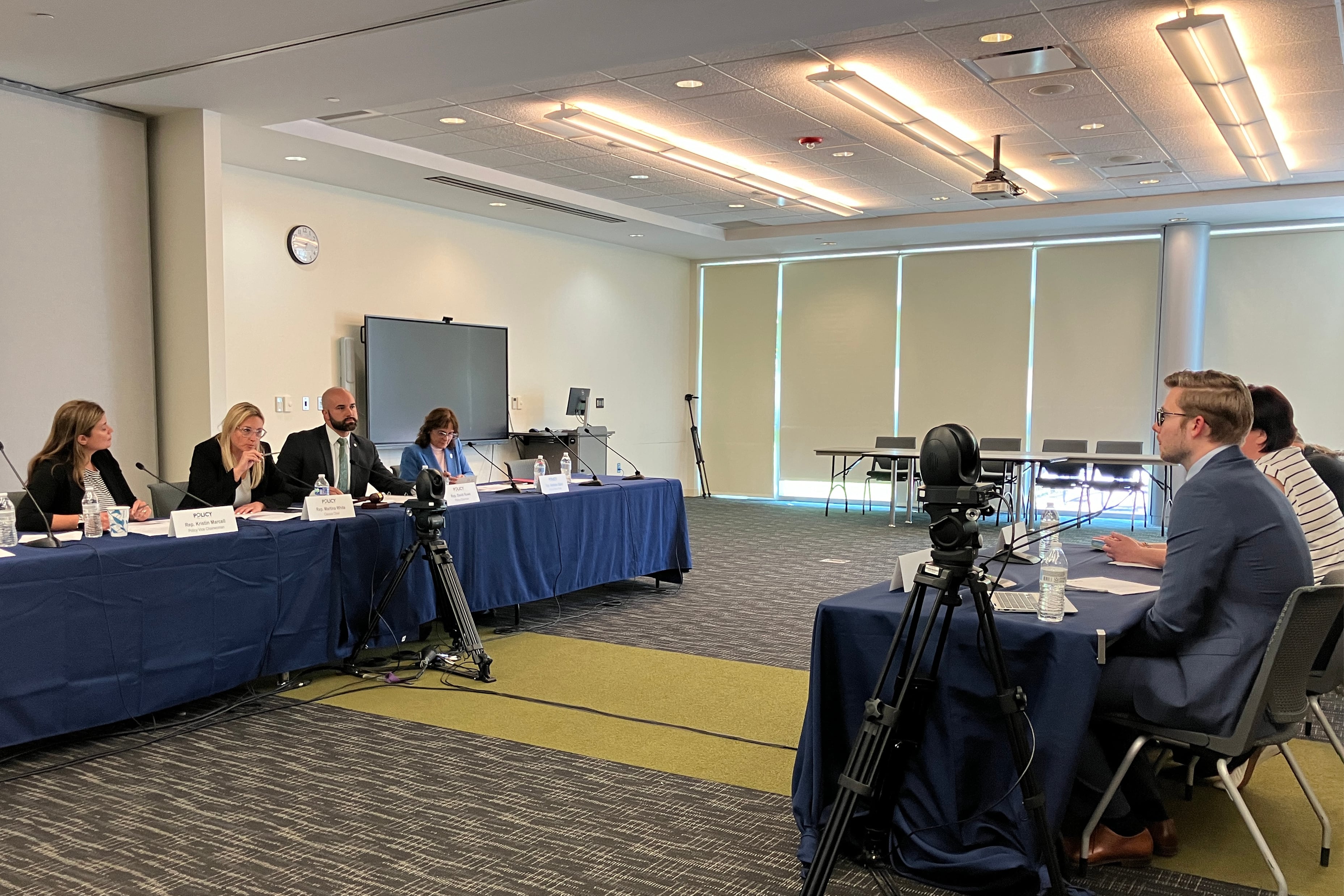Sign up for Chalkbeat Philadelphia’s free newsletter to keep up with news on the city’s public school system.
As Congress considers establishing a national school choice program, Pennsylvania Republicans are trying to revive plans for a statewide school voucher program.
State Rep. Martina White, who represents parts of Philadelphia, organized a Republican policy committee hearing on Monday to examine the School District of Philadelphia’s finances, staffing, and possible “waste, fraud, and abuse.” But no school district leaders were present at Monday’s hearing to answer lawmakers’ questions.
White and at least one fellow lawmaker said they came away from the hearing with a renewed belief that private school vouchers would benefit Philadelphia families who are unhappy with the condition and performance of their city schools. White told Chalkbeat on Monday that schools in her Northeast Philly neighborhood are overcrowded, and she would like to see “basically a school voucher” be made available to those parents “to be able to use that for the child to go to the school of their choice.”
Earlier this month, the state Senate education committee approved legislation to create a new voucher program called the Pennsylvania Award for Student Success — or PASS — Scholarship.
The bill would establish state-backed scholarship funds that eligible students could use to pay for tuition and fees for attendance at participating private schools. This year’s PASS legislation is nearly identical to last year’s proposal and very similar to a program called Lifeline Scholarships from two years ago.
Republicans’ support for private school vouchers is important because, as lawmakers decide on the state budget and how much money to provide public schools, state GOP leaders also say they are unconvinced that increasing funding to school districts will improve student outcomes. While Republicans control the Pennsylvania Senate, Democrats control the House.
When schools get more money, students tend to stay in school longer and score better on exams, according to a 2023 review of dozens of studies.
Vouchers have a questionable track record regarding their ability to improve student outcomes. But private school choice programs have proliferated at the state level in recent years. President Donald Trump supports vouchers. And a Republican budget bill in Congress would establish $5 billion in annual tax credits to fund private school scholarships, although the future of that provision of the bill is also unclear.
Pennsylvania Republicans have tried but failed for years to create a new voucher program at the state level. Gov. Josh Shapiro, a Democrat, at one time supported legislation to establish vouchers, but he subsequently backed off that position and vetoed the Lifeline Scholarships proposal in 2023. State Sen. Anthony Williams, a Philadelphia Democrat, has also supported state GOP voucher proposals, including this year’s PASS legislation.
Pennsylvania already has two programs that use tax credits to fund scholarships: the Opportunity Scholarship Tax Credit and the Education Improvement Tax Credit.
Philadelphia school leaders say district needs more funding
The Pennsylvania House policy committee, which White convened Monday to discuss Philly schools, has no legislative or administrative power over the school district. But White said what she and other lawmakers need to see in Philly are “real results for kids and families.”
Though White said school district representatives were invited to the hearing, none were available to answer lawmakers’ questions in person and submitted written testimony instead.
Superintendent Tony Watlington and Board of Education President Reginald Streater wrote in their testimony that the district has made “significant” progress improving student attendance, decreasing the number of students who have dropped out, improving third graders’ reading scores, as well as students passing their career and technical exams.
They also wrote that the district has “stabilized its finances,” received a positive credit rating affirmation, and are in need of more funding — which state lawmakers are in a position to provide or withhold.
“Despite making academic gains and appropriately managing our finances, decades of chronic underfunding continues to be a critical challenge for the district,” Watlington and Streater wrote.
White expressed disappointment that no district officials appeared in person to testify. District spokesperson Monique Braxton said in a Monday email that officials have invited White to meet with district leaders.
The policy committee did hear testimony from one Philadelphia parent as well as Christian Barnard, a policy analyst with the libertarian Reason Foundation think tank who criticized the district in several ways.
For example, Barnard (and White) said they were unhappy with the level of fiscal transparency publicly available for individual schools. However, school-level budgets are on the district’s website and include line-item descriptions of funding allotments for staff, extracurriculars, special education, and more.
Barnard also said the district is being inefficient by not reapportioning staff to account for school enrollment changes. Though the district recently ended the controversial practice of reassigning teachers once the school year has begun, Braxton said that staff are still moved around according to school needs and budgets. And Barnard said he was “skeptical” about the district’s assertion that it is underfunded, a claim backed up by a Commonwealth Court judge’s 2023 opinion that found the state system of funding schools was unconstitutional.
The Philly district, which is facing a growing annual deficit, is also undertaking a “rightsizing” process that the school board has warned will likely result in some school closures, colocations, or repurposing buildings.
Ultimately. White said the district is working through its challenges, but she would like to see the district embrace more choice for families — starting with approving additional charter school proposals or seat expansions. The school board has not approved a new charter school since 2018 but it has added more than 2,000 charter seats over the same period of time.
White also said that lawmakers “need to know that taxpayer funds are not being wasted or misallocated.”
She said she hopes to collaborate on that effort with the school district and bring that message to the state capitol.
Carly Sitrin is the bureau chief for Chalkbeat Philadelphia. Contact Carly at csitrin@chalkbeat.org.






